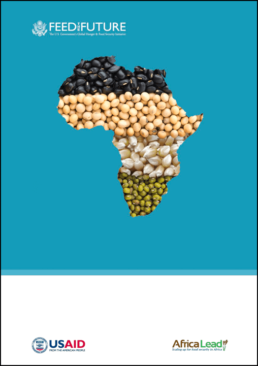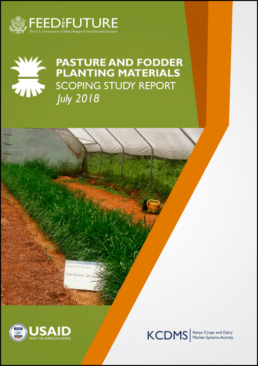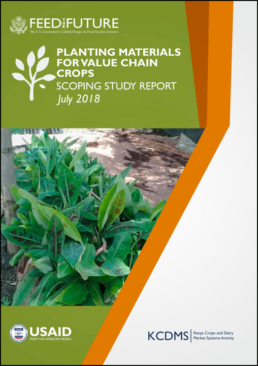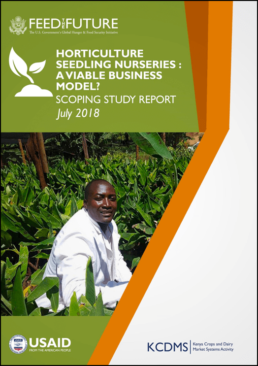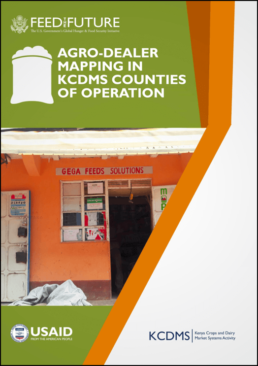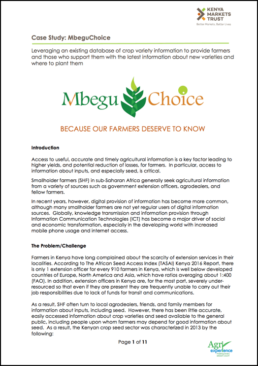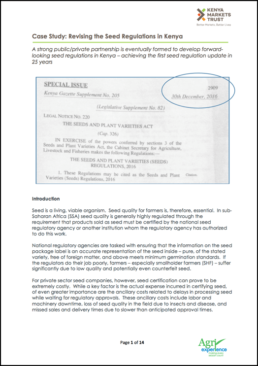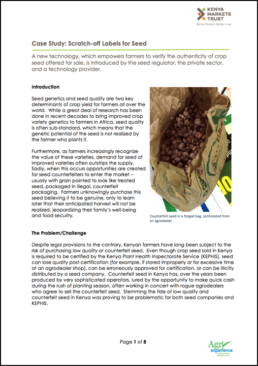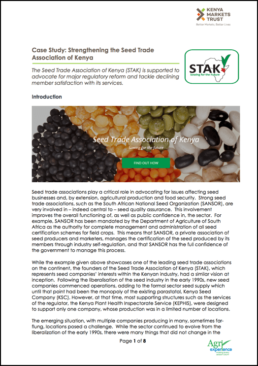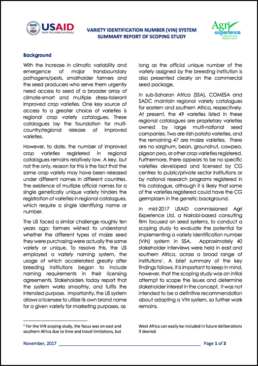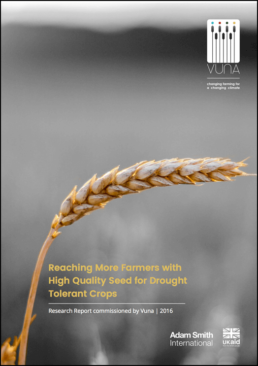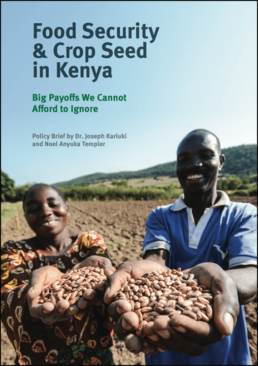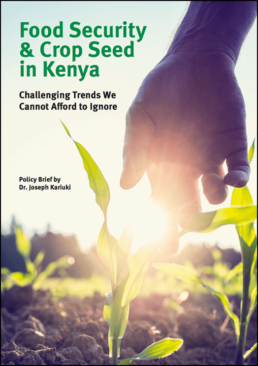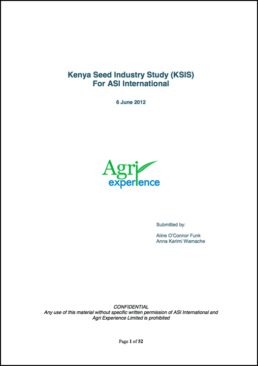The breadth and impact of our work are highlighted in the following selected reports for which we served as the primary author, implementer, and/or researcher, and examples of assignments.
The breadth and impact of our work are highlighted in the following selected reports for which we served as the primary author, implementer, and/or researcher, and examples of assignments.
Downloads
Below are downloadable versions of client reports and case studies that are in the public domain. Additional significant client work has been completed, but is not available to the public per the terms of client engagement.
Assessment to Support the Promotion of Regional Seed Trade in East Africa
Scoping Study: Pasture and Fodder Planting Materials in Kenya
Scoping Study: Planting Materials for Value Chain Crops in Kenya (banana, avocado, mango, pineapples, passion fruit, sweet potatoes, African leafy vegetables)
Scoping Study: Horticulture Seedling Nurseries as a Viable Business Model in Kenya
USAID/Kenya Crop and Dairy Market Systems Activity (RTI), July 2018
Agri Experience Ltd. (2018). Scoping Study: Horticulture Seedling Nurseries as a Viable Business Model in Kenya. Nairobi: Kenya Crops and Dairy Market Systems Activity (KCDMS).
Assessment to Support the Promotion of Regional Seed Trade in East Africa
Scoping Study: Pasture and Fodder Planting Materials in Kenya
Scoping Study: Planting Materials for Value Chain Crops in Kenya (banana, avocado, mango, pineapples, passion fruit, sweet potatoes, African leafy vegetables)
Scoping Study: Horticulture Seedling Nurseries as a Viable Business Model in Kenya
USAID/Kenya Crop and Dairy Market Systems Activity (RTI), July 2018
Agri Experience Ltd. (2018). Scoping Study: Horticulture Seedling Nurseries as a Viable Business Model in Kenya. Nairobi: Kenya Crops and Dairy Market Systems Activity (KCDMS).
Variety Identification Number (VIN) System (Summary Report of Scoping Study)
USAID, 2017
O’Connor, A., & Maina, M. (2017). Scoping Study: Summary Report of Variety Identification Number (VIN) System Report. Agri Experience Ltd. Nairobi: USAID.
Reaching More Farmers with High Quality Seed for Drought Tolerant Crops
Crop Seed Company Proposition for Improving Current Seed Regulation in Kenya
Variety Identification Number (VIN) System (Summary Report of Scoping Study)
USAID, 2017
O’Connor, A., & Maina, M. (2017). Scoping Study: Summary Report of Variety Identification Number (VIN) System Report. Agri Experience Ltd. Nairobi: USAID.
Reaching More Farmers with High Quality Seed for Drought Tolerant Crops
Crop Seed Company Proposition for Improving Current Seed Regulation in Kenya
Food Security & Crop Seed in Kenya (Part 2): Big Payoffs We Cannot Afford to Ignore
Food Security & Crop Seed in Kenya (Part 1): Challenging Trends We Cannot Afford to Ignore
DfID/Kenya Markets Trust Market Assistance Program: Seed Sector, 2015
Kariuki, J. (2015). Food Security & Crop Seed in Kenya (Part 1): Challenging Trends We Cannot Afford to Ignore. Agri Experience. Nairobi: Kenya Markets Trust. Retrieved from www.kenyamarkets.org
Food Security & Crop Seed in Kenya (Part 2): Big Payoffs We Cannot Afford to Ignore
Food Security & Crop Seed in Kenya (Part 1): Challenging Trends We Cannot Afford to Ignore
DfID/Kenya Markets Trust Market Assistance Program: Seed Sector, 2015
Kariuki, J. (2015). Food Security & Crop Seed in Kenya (Part 1): Challenging Trends We Cannot Afford to Ignore. Agri Experience. Nairobi: Kenya Markets Trust. Retrieved from www.kenyamarkets.org
Examples of Assignments
To provide insight into how we work, we present examples below of specific assignments.
Click the Titles in the Left Column Below for Example Details
Tap to Open
Bringing accurate and transparent information to seed sector stakeholders
Client’s challenge
Kenya Markets Trust (KMT) selected Kenya’s crop seed industry as one of the focus sectors for their Market Assistance Program. One of the key challenges in the sector was the lack of available information that stakeholders could easily use for decision-making, particularly with respect to business growth and investment. Agri Experience was selected as KMT’s partner for the crop seed sector work, and one of the initial goals of the partnership was to address the lack of useful and easily available information in the sector.
Agri Experience solution
Agri Experience surveyed multiple stakeholders to fully understand their information needs, particularly the needs related to growing their businesses and increasing investment in the sector. The next step was to identify key partners for collaboration in bringing more useful information to sector participants. Key among these collaborators were the Kenya Plant Health Inspectorate Service (KEPHIS), the Kenya Agriculture and Livestock Research Organization (KALRO) and the Seed Trade Association of Kenya (STAK).
Agri Experience worked with the collaborators for close to a year to build a comprehensive and transparent database of key industry information for use by both public and private sector stakeholders, particularly seed companies. Data was collected on: crop varieties released, licensed, and commercialized in the market; agrodealer locations and contact information; and industry participants including service providers, seed companies, and more.
The data was set up in an easy-to-use online format, with filtering, mapping, and key word search capabilities.
Client benefit
In line with KMT’s vision of a more innovative, inclusive crop seed sector, usage of the Platform, which was designed to be used by industry participants such as businesses, researchers and regulators, has been widespread and robust. Although it is a business oriented site and not intended for mass usage, the Platform now has over 1,200 repeat users in Kenya alone. Seed companies are using it to identify agrodealers to distribute their seed, understand product gaps in the market, and obtain contact information for service providers, while industry analysts are using it to understand varieties released, age of releases, and licensing patterns. The transparent provision of information to stakeholders has combined with other change efforts in the sector to accelerate the pace of new variety releases, increase distribution through agrodealers, and increase overall investment in the sector.
In 2016 the Seed Trade Association of Kenya assumed responsibility for the Platform, which can be found at http://www.seedsectorplatformkenya.com/
Educating crop breeders about crop seed commercialisation
Client’s challenge
The West African Center for Crop Improvement (WACCI), based at the University of Ghana, Legon, has an ambitious mission. “We will develop the next generation of plant breeders and seed scientists needed for the transformation of Africa’s agriculture through high-quality research, teaching and learning.”
To date, WACCI has enrolled 108 PhD students from 16 countries in West, East, and Central African countries.
Like all experienced development partners working in the seed sector in sub-Saharan Africa, WACCI realized that great research and breeding does not advance the sector unless the results are delivered – at large scale – to Africa’s smallholder farmers. As a result, in a visionary move WACCI decided to break with the traditional breeding curriculum and include an intensive module on seed business management in its PhD breeding program so that its graduates would be better prepared to link with the partners, both public and private, who could take their research to scale on farmers’ fields.
Agri Experience consulting role
Agri Experience was brought in to provide training materials and an experienced practitioner to lead the module on Seed Business Management, including crop seed production, marketing, financing, cash flow, and human resources skills. As a result, on an annual basis WACCI students have been intensively instructed in topics such as:
- Seed production forecasting and parent seed supply
- Seed quality, both in the field and in storage
- Seed marketing and promotion
- Seed company profitability and sustainability
- The role of breeders in supporting and educating seed company managers
- Seed production research
In addition, the student scientists have been exposed to the most recent research on seed sector trends in Africa, challenges and opportunities in bringing high quality seed of modern varieties to farmers in Africa, and farmer attitudes on adopting new varieties.
Client benefit
Almost all of the WACCI PhD students are mid-career scientists with their national research organizations who return to their organizations to begin their PhD research once their classroom work is completed at WACCI. Due to their exposure at WACCI to seed business management and large scale commercial seed production and distribution, the students are uniquely prepared to begin to link to the partners – including local entrepreneurs and regulators – who can bring their newly bred varieties to farmers in large volumes.
WACCI’s visionary goal is not simply to train the next generation of scientists, but to help those scientists realize their dreams of changing farmers’ lives, at scale. Delivering on this vision, WACCI equips graduates to understand and work with the commercial partners who can make this dream a reality.
WACCI was recently named by the World Bank as an Africa Centre of Excellence.
Introducing new drought tolerant maize varieties into the market
Client’s challenge
The client had a pipeline of drought tolerant maize varieties to introduce to the market, but was unsure of how to best support private sector licensees to rapidly produce, market, and distribute significant volumes of seed of the new varieties. There was a sense of urgency as the new drought tolerant maize varieties would enable farmers to rapidly respond to climate change and mitigate farmer risk.
Agri Experience solution
After discussing the challenge and possible solutions, Agri Experience was contracted to interview and survey private sector companies to develop a full understanding of their needs and practices with respect to maize variety production, marketing and distribution, with particular emphasis on their information needs.
The assignment focused on:
- helping the client to fully understand how private sector companies make commercialisation decisions;
- advising client how to best meet the information needs of the seed companies in this decision-making process; and
- laying a strong foundation for future product rollouts by identifying best practices for client to follow, and by fostering a strong understanding of private sector needs with respect to new product introductions.
Areas of inquiry ranged from parent seed challenges and needs, to production and promotion timelines, to capital investment required, to product line expansion plans.
Client benefit
Ultimately the first generation product rollout was one of the most rapid, and successful, experienced by the client.
The study results informed many decisions the client made about product roll out, including provision of technical information on parent seed, timelines, marketing materials, and promotional activities.
Agri Experience also ran a training for the client’s senior staff, who were primarily scientists, to help strengthen their capacity to work effectively with seed company entrepreneurs on an ongoing basis. The highly interactive training, titled “How to Think Like a Private Sector Seed Company”, was credited by the client as critical for their later success.
The second generation varieties are now being rolled out and seed company interest is robust.
Client’s challenge
Kenya Markets Trust (KMT) selected Kenya’s crop seed industry as one of the focus sectors for their Market Assistance Program. One of the key challenges in the sector was the lack of available information that stakeholders could easily use for decision-making, particularly with respect to business growth and investment. Agri Experience was selected as KMT’s partner for the crop seed sector work, and one of the initial goals of the partnership was to address the lack of useful and easily available information in the sector.
Agri Experience solution
Agri Experience surveyed multiple stakeholders to fully understand their information needs, particularly the needs related to growing their businesses and increasing investment in the sector. The next step was to identify key partners for collaboration in bringing more useful information to sector participants. Key among these collaborators were the Kenya Plant Health Inspectorate Service (KEPHIS), the Kenya Agriculture and Livestock Research Organization (KALRO) and the Seed Trade Association of Kenya (STAK).
Agri Experience worked with the collaborators for close to a year to build a comprehensive and transparent database of key industry information for use by both public and private sector stakeholders, particularly seed companies. Data was collected on: crop varieties released, licensed, and commercialized in the market; agrodealer locations and contact information; and industry participants including service providers, seed companies, and more.
The data was set up in an easy-to-use online format, with filtering, mapping, and key word search capabilities.
Client benefit
In line with KMT’s vision of a more innovative, inclusive crop seed sector, usage of the Platform, which was designed to be used by industry participants such as businesses, researchers and regulators, has been widespread and robust. Although it is a business oriented site and not intended for mass usage, the Platform now has over 1,200 repeat users in Kenya alone. Seed companies are using it to identify agrodealers to distribute their seed, understand product gaps in the market, and obtain contact information for service providers, while industry analysts are using it to understand varieties released, age of releases, and licensing patterns. The transparent provision of information to stakeholders has combined with other change efforts in the sector to accelerate the pace of new variety releases, increase distribution through agrodealers, and increase overall investment in the sector.
In 2016 the Seed Trade Association of Kenya assumed responsibility for the Platform, which can be found at http://www.seedsectorplatformkenya.com/
Client’s challenge
The West African Center for Crop Improvement (WACCI), based at the University of Ghana, Legon, has an ambitious mission. “We will develop the next generation of plant breeders and seed scientists needed for the transformation of Africa’s agriculture through high-quality research, teaching and learning.”
To date, WACCI has enrolled 108 PhD students from 16 countries in West, East, and Central African countries.
Like all experienced development partners working in the seed sector in sub-Saharan Africa, WACCI realized that great research and breeding does not advance the sector unless the results are delivered – at large scale – to Africa’s smallholder farmers. As a result, in a visionary move WACCI decided to break with the traditional breeding curriculum and include an intensive module on seed business management in its PhD breeding program so that its graduates would be better prepared to link with the partners, both public and private, who could take their research to scale on farmers’ fields.
Agri Experience consulting role
Agri Experience was brought in to provide training materials and an experienced practitioner to lead the module on Seed Business Management, including crop seed production, marketing, financing, cash flow, and human resources skills. As a result, on an annual basis WACCI students have been intensively instructed in topics such as:
- Seed production forecasting and parent seed supply
- Seed quality, both in the field and in storage
- Seed marketing and promotion
- Seed company profitability and sustainability
- The role of breeders in supporting and educating seed company managers
- Seed production research
In addition, the student scientists have been exposed to the most recent research on seed sector trends in Africa, challenges and opportunities in bringing high quality seed of modern varieties to farmers in Africa, and farmer attitudes on adopting new varieties.
Client benefit
Almost all of the WACCI PhD students are mid-career scientists with their national research organizations who return to their organizations to begin their PhD research once their classroom work is completed at WACCI. Due to their exposure at WACCI to seed business management and large scale commercial seed production and distribution, the students are uniquely prepared to begin to link to the partners – including local entrepreneurs and regulators – who can bring their newly bred varieties to farmers in large volumes.
WACCI’s visionary goal is not simply to train the next generation of scientists, but to help those scientists realize their dreams of changing farmers’ lives, at scale. Delivering on this vision, WACCI equips graduates to understand and work with the commercial partners who can make this dream a reality.
WACCI was recently named by the World Bank as an Africa Centre of Excellence.
Client’s challenge
The client had a pipeline of drought tolerant maize varieties to introduce to the market, but was unsure of how to best support private sector licensees to rapidly produce, market, and distribute significant volumes of seed of the new varieties. There was a sense of urgency as the new drought tolerant maize varieties would enable farmers to rapidly respond to climate change and mitigate farmer risk.
Agri Experience solution
After discussing the challenge and possible solutions, Agri Experience was contracted to interview and survey private sector companies to develop a full understanding of their needs and practices with respect to maize variety production, marketing and distribution, with particular emphasis on their information needs.
The assignment focused on:
- helping the client to fully understand how private sector companies make commercialisation decisions;
- advising client how to best meet the information needs of the seed companies in this decision-making process; and
- laying a strong foundation for future product rollouts by identifying best practices for client to follow, and by fostering a strong understanding of private sector needs with respect to new product introductions.
Areas of inquiry ranged from parent seed challenges and needs, to production and promotion timelines, to capital investment required, to product line expansion plans.
Client benefit
Ultimately the first generation product rollout was one of the most rapid, and successful, experienced by the client.
The study results informed many decisions the client made about product roll out, including provision of technical information on parent seed, timelines, marketing materials, and promotional activities.
Agri Experience also ran a training for the client’s senior staff, who were primarily scientists, to help strengthen their capacity to work effectively with seed company entrepreneurs on an ongoing basis. The highly interactive training, titled “How to Think Like a Private Sector Seed Company”, was credited by the client as critical for their later success.
The second generation varieties are now being rolled out and seed company interest is robust.

